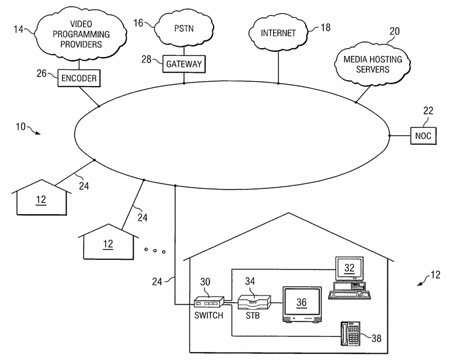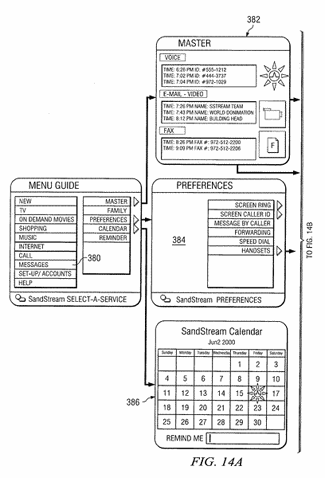Cisco's Triple Threat
Cisco owns the triple play

5:00 PM -- From The Philter's They Can Patent Anything file, I present to you hard proof that Cisco Systems Inc. (Nasdaq: CSCO) owns the triple play.
Patent 7075919, awarded to Cisco earlier this year, states that Cisco is the proud owner of any "System and method for providing integrated voice, video and data to customer premises over a single network."
There's some weird history here. Apparently the patent was written by Tom Wendt, who used to be an executive at Sandstream Communications & Entertainment, Inc., an early IPTV distribution company. Sandstream died in either the late 90s or early aughts and Cisco picked up its intellectual property in a sale.
The patent was written by Wendt, who founded Optical Entertainment Network, and others in August 2000 and the patent was granted nearly six years later.
What does it mean? Well, it's hard to say. But reading through the broadly-worded claim, it sounds as though Cisco could go to AT&T Inc. (NYSE: T), Charter Communications Inc. , and any other company providing voice, data, and video services across a single network and ask for some scratch.
And, if carriers do have to pay a triple play tax to Cisco, would that mean our broadband prices would go up? Telcos have already made it clear that they don't mind passing unexpected costs (and savings) on to customers. (See Verizon Drops New DSL Fees.)
Check out some of the patent language:
Rather than attempting to converge the incompatible architectures, protocols, and other characteristics of the various existing voice, video and data network infrastructures, the present invention provides a single fully interoperable network that uses a common standard protocol, such as TCP/IP, to provide integrated voice, video, and data content to customer premises over a single communication link. Since all services are provided to the customer premises using a single network infrastructure, problems associated with delivering incompatible services to the customer premises are eliminated. The single network infrastructure of the present invention also allows for enhanced troubleshooting, fault-tolerance, access restriction, and other important benefits.
 Imagine the possibilities if one could actually build a triple play network, as proposed by the Cisco patent:
Imagine the possibilities if one could actually build a triple play network, as proposed by the Cisco patent:
Similarly, media hosting servers may provide content, such as video games, music files, and video on demand (VOD), that is stored digitally and communicated over network in the form of TCP/IP packets. Media hosting servers will typically include "TCP/IP stacks" that provide the necessary hardware and software for encapsulating data for transmission as TCP/IP packets. After the selected services have been converted, if appropriate, into TCP/IP packets and communicated to network, the services may be delivered in any suitable combination to customer premises according to the particular needs of associated users.
 Games, music, and video on demand? Well, most carriers aren't that advanced yet. But it will be interesting to watch if either Cisco or Mr. Wendt lawyer-up on some carriers in an attempt to collect a buck for the idea of a multiservice, single protocol, one-wire network reaching consumer homes.
Games, music, and video on demand? Well, most carriers aren't that advanced yet. But it will be interesting to watch if either Cisco or Mr. Wendt lawyer-up on some carriers in an attempt to collect a buck for the idea of a multiservice, single protocol, one-wire network reaching consumer homes.
Stranger things have happened, I'm sure. (Remember when BT Group plc (NYSE: BT; London: BTA) claimed to own hyperlinking?) But the triple play network is, indeed, an idea whose time has come.
— Phil Harvey, News Editor, Light Reading
About the Author(s)
You May Also Like




_International_Software_Products.jpeg?width=300&auto=webp&quality=80&disable=upscale)







